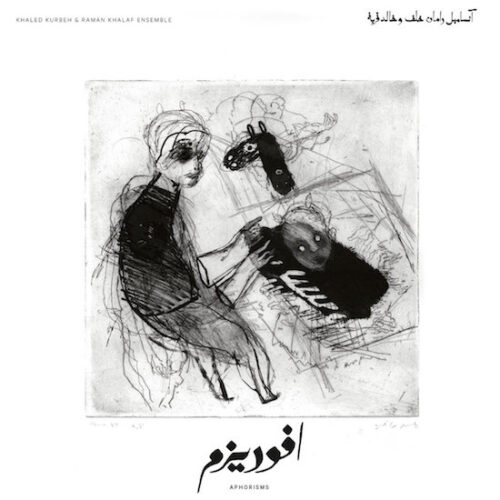Amid the constant replay of harrowing images of burnt-out buildings in Aleppo, the sprawling rubble dust of Raqqa, and devastating refugee displacement, the narrative currently painted of Syria is one of historical effacement. Yet Syria has one of the richest cultural histories in the world, contributing greatly to Arabic classical music with the cyclical poetics of Aleppo’s muwashshah, as well as being deeply influential in the 19th century Arab literary revival, producing poet Adunis, free verse writer Muhammad al-Maghout and novelist Haidar Haidar. Now striving to continue in this tradition – regardless of political ruin – are Syrian musicians Khaled Kurbeh and Raman Khalaf with their debut LP, Aphorisms.
Pianist Kurbeh and oud player Khalaf have been performing together since 2015, merging Arabic classical music with western jazz and classical traditions to create a new vernacular of chamber music. Currently based in Berlin, their compositions straddle the electronic and acoustic, as evinced by this record’s release on a new curatorial project, ‘Between Buttons’, by house veteran Henrik Schwarz. Don’t expect a 4/4 kick though, as Aphorisms’ influences are more subtly worked, centring around an interplay between Khalaf’s lyrical oud and plaintive vocalisations with Kurbeh’s jazz and classical-influenced piano and synthesizer work. Recorded with a Berlin-based ensemble, Aphorisms is at once a record of cultural specificity and an interdisciplinary work of boundary-defying art.
Opener ‘Toska’ is cinematic in scope with its measured djembe, streaking violins and percussive piano chords, building over seven minutes towards Khalaf’s whispered vocals, which evoke a fragmented narrative. This wordless language is perpetuated through the constant interaction between styles, forming a dialogue among piano, double bass and synth on ‘Interlude’, while on ‘To Kafranbel’ the musical speech is a nimble dance between the dynamic variations of jazz melody, bass harmony, and rattling oud sounds.
The transition to the B-side of the six-track record is one of introspection on ‘Al Baseet’. Beginning as a slow duet between oud and piano, jazz and maquam, a rhythmic energy soon takes over, similar to the rondeau of ‘To Kafranbel’ but this time accentuated by Nora Thiele’s percussion and Khalaf’s forceful assonance. Handclaps and Tom Berkmann’s bass-driven motifs continue on the propulsive ‘Shamal’ – a largely improvised display of rhythmic trading between ensemble members. Finally, the piano and bass duet of ‘Einsamkeit Impromptu’ rounds off Aphorisms on an elegiac jazz waltz.
In its mere 25-minute running time, Aphorisms contains a depth of instrumental expression within a tightly constrained framework. The effect is that certain compositions feel the need to breathe, to be given the freedom of the live stage in order to reach their full potential. For instance, ‘Shamal’ ends abruptly, as if the tape had been cut, while more could have been made of the synthesizer on the one-minute ‘Interlude’, making the electronics an integral thematic component. Still, Aphorisms conducts itself with grace and a quiet insistence, showcasing the enduring identity of Arabic music and its constant evolution.



